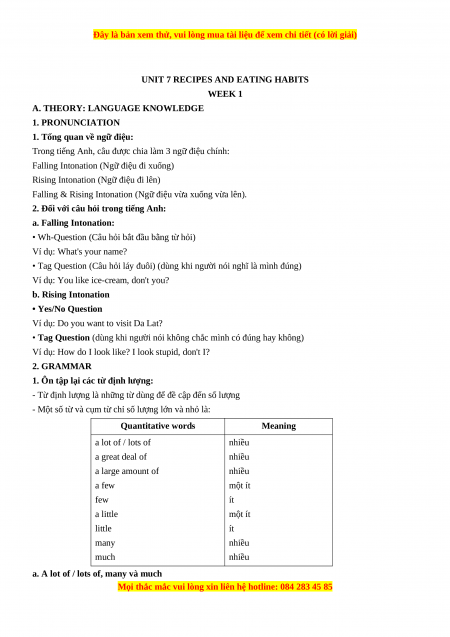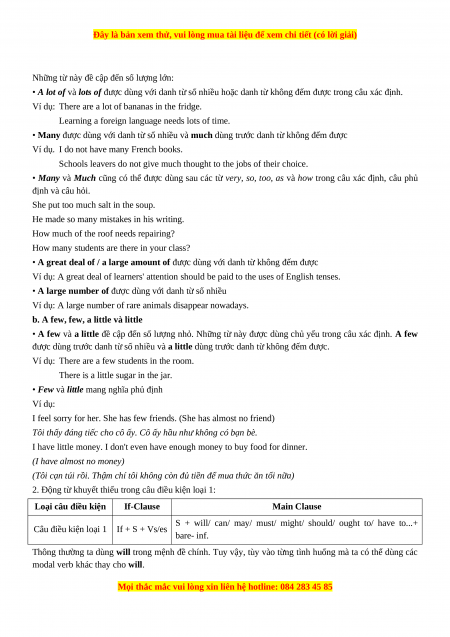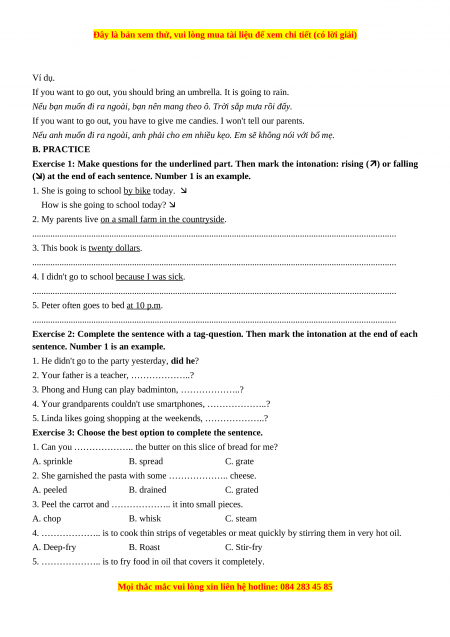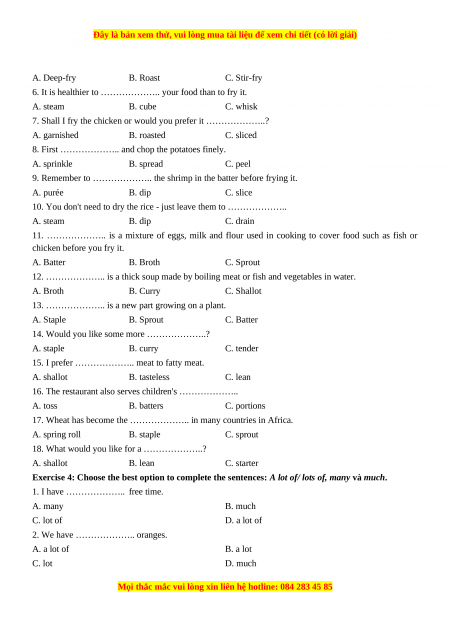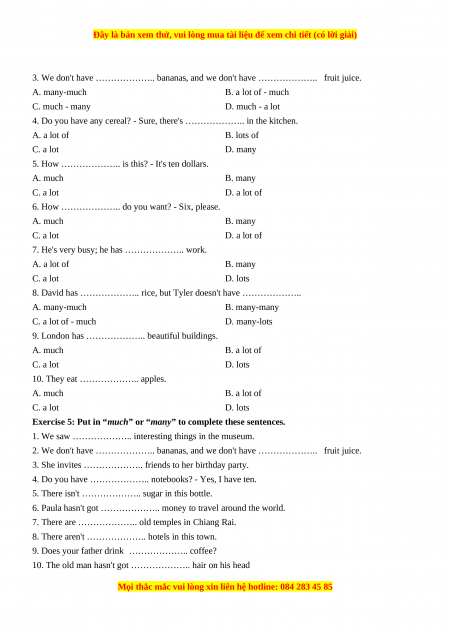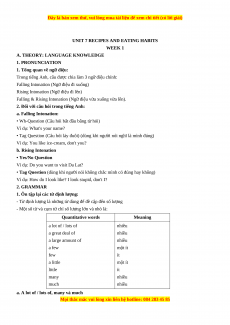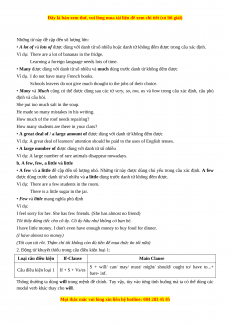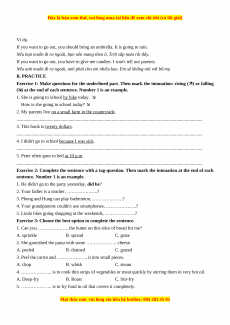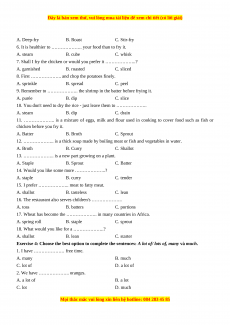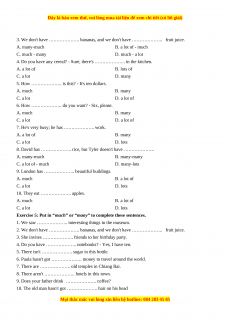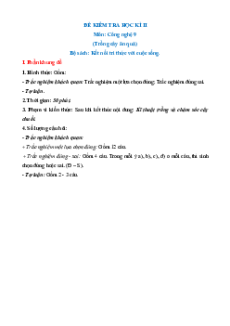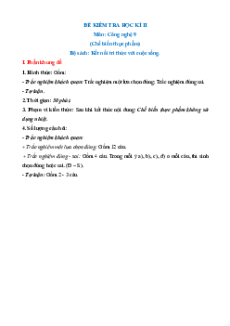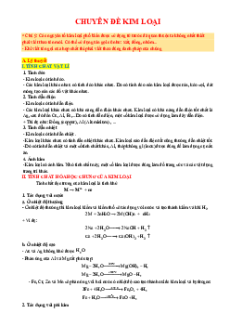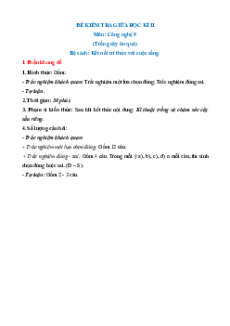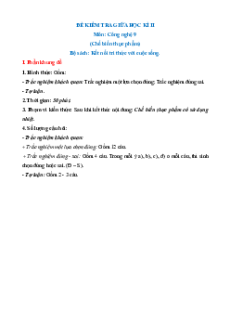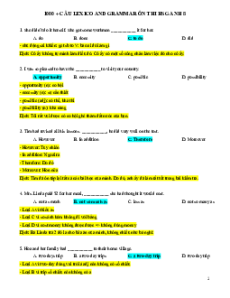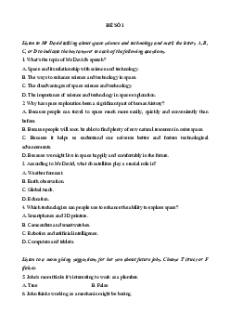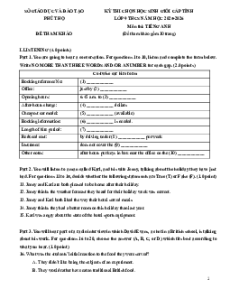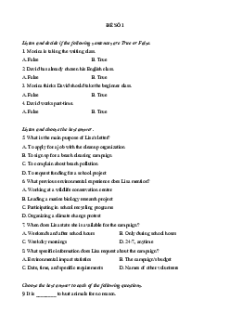UNIT 7 RECIPES AND EATING HABITS WEEK 1
A. THEORY: LANGUAGE KNOWLEDGE 1. PRONUNCIATION
1. Tổng quan về ngữ điệu:
Trong tiếng Anh, câu được chia làm 3 ngữ điệu chính:
Falling Intonation (Ngữ điệu đi xuống)
Rising Intonation (Ngữ điệu đi lên)
Falling & Rising Intonation (Ngữ điệu vừa xuống vừa lên).
2. Đối với câu hỏi trong tiếng Anh: a. Falling Intonation:
• Wh-Question (Câu hỏi bắt đầu bằng từ hỏi) Ví dụ: What's your name?
• Tag Question (Câu hỏi láy đuôi) (dùng khi người nói nghĩ là mình đúng)
Ví dụ: You like ice-cream, don't you? b. Rising Intonation • Yes/No Question
Ví dụ: Do you want to visit Da Lat?
• Tag Question (dùng khi người nói không chắc mình có đúng hay không)
Ví dụ: How do I look like? I look stupid, don't I? 2. GRAMMAR
1. Ôn tập lại các từ định lượng:
- Từ định lượng là những từ dùng để đề cập đến số lượng
- Một số từ và cụm từ chỉ số lượng lớn và nhỏ là: Quantitative words Meaning a lot of / lots of nhiều a great deal of nhiều a large amount of nhiều a few một ít few ít a little một ít little ít many nhiều much nhiều
a. A lot of / lots of, many và much
Những từ này đề cập đến số lượng lớn:
• A lot of và lots of được dùng với danh từ số nhiều hoặc danh từ không đếm được trong câu xác định.
Ví dụ: There are a lot of bananas in the fridge.
Learning a foreign language needs lots of time.
• Many được dùng với danh từ số nhiều và much dùng trước danh từ không đếm được
Ví dụ. I do not have many French books.
Schools leavers do not give much thought to the jobs of their choice.
• Many và Much cũng có thể được dùng sau các từ very, so, too, as và how trong câu xác định, câu phủ định và câu hỏi.
She put too much salt in the soup.
He made so many mistakes in his writing.
How much of the roof needs repairing?
How many students are there in your class?
• A great deal of / a large amount of được dùng với danh từ không đếm được
Ví dụ: A great deal of learners' attention should be paid to the uses of English tenses.
• A large number of được dùng với danh từ số nhiều
Ví dụ: A large number of rare animals disappear nowadays.
b. A few, few, a little và little
• A few và a little đề cập đến số lượng nhỏ. Những từ này được dùng chủ yếu trong câu xác định. A few
được dùng trước danh từ số nhiều và a little dùng trước danh từ không đếm được.
Ví dụ: There are a few students in the room.
There is a little sugar in the jar.
• Few và little mang nghĩa phủ định Ví dụ:
I feel sorry for her. She has few friends. (She has almost no friend)
Tôi thấy đáng tiếc cho cô ấy. Cô ấy hầu như không có bạn bè.
I have little money. I don't even have enough money to buy food for dinner. (I have almost no money)
(Tôi cạn túi rồi. Thậm chí tôi không còn đủ tiền để mua thức ăn tối nữa)
2. Động từ khuyết thiếu trong câu điều kiện loại 1:
Loại câu điều kiện If-Clause Main Clause
S + will/ can/ may/ must/ might/ should/ ought to/ have to...+
Câu điều kiện loại 1 If + S + Vs/es bare- inf.
Thông thường ta dùng will trong mệnh đề chính. Tuy vậy, tùy vào từng tình huống mà ta có thể dùng các
modal verb khác thay cho will.
Ví dụ.
If you want to go out, you should bring an umbrella. It is going to rain.
Nếu bạn muốn đi ra ngoài, bạn nên mang theo ô. Trời sắp mưa rồi đấy.
If you want to go out, you have to give me candies. I won't tell our parents.
Nếu anh muốn đi ra ngoài, anh phải cho em nhiều kẹo. Em sẽ không nói với bố mẹ. B. PRACTICE
Exercise 1: Make questions for the underlined part. Then mark the intonation: rising () or falling
() at the end of each sentence. Number 1 is an example.
1. She is going to school by bike today.
How is she going to school today?
2. My parents live on a small farm in the countryside.
................................................................................................................................................................
3. This book is twenty dollars.
................................................................................................................................................................
4. I didn't go to school because I was sick.
................................................................................................................................................................
5. Peter often goes to bed at 10 p.m.
................................................................................................................................................................
Exercise 2: Complete the sentence with a tag-question. Then mark the intonation at the end of each
sentence. Number 1 is an example.
1. He didn't go to the party yesterday, did he?
2. Your father is a teacher, ………………..?
3. Phong and Hung can play badminton, ………………..?
4. Your grandparents couldn't use smartphones, ………………..?
5. Linda likes going shopping at the weekends, ………………..?
Exercise 3: Choose the best option to complete the sentence.
1. Can you ……………….. the butter on this slice of bread for me? A. sprinkle B. spread C. grate
2. She garnished the pasta with some ……………….. cheese. A. peeled B. drained C. grated
3. Peel the carrot and ……………….. it into small pieces. A. chop B. whisk C. steam
4. ……………….. is to cook thin strips of vegetables or meat quickly by stirring them in very hot oil. A. Deep-fry B. Roast C. Stir-fry
5. ……………….. is to fry food in oil that covers it completely.
A. Deep-fry B. Roast C. Stir-fry
6. It is healthier to ……………….. your food than to fry it. A. steam B. cube C. whisk
7. Shall I fry the chicken or would you prefer it ………………..? A. garnished B. roasted C. sliced
8. First ……………….. and chop the potatoes finely. A. sprinkle B. spread C. peel
9. Remember to ……………….. the shrimp in the batter before frying it. A. purée B. dip C. slice
10. You don't need to dry the rice - just leave them to ……………….. A. steam B. dip C. drain
11. ……………….. is a mixture of eggs, milk and flour used in cooking to cover food such as fish or chicken before you fry it. A. Batter B. Broth C. Sprout
12. ……………….. is a thick soup made by boiling meat or fish and vegetables in water. A. Broth B. Curry C. Shallot
13. ……………….. is a new part growing on a plant. A. Staple B. Sprout C. Batter
14. Would you like some more ………………..? A. staple B. curry C. tender
15. I prefer ……………….. meat to fatty meat. A. shallot B. tasteless C. lean
16. The restaurant also serves children's ……………….. A. toss B. batters C. portions
17. Wheat has become the ……………….. in many countries in Africa. A. spring roll B. staple C. sprout
18. What would you like for a ………………..? A. shallot B. lean C. starter
Exercise 4: Choose the best option to complete the sentences: A lot of/ lots of, many và much.
1. I have ……………….. free time. A. many B. much C. lot of D. a lot of
2. We have ……………….. oranges. A. a lot of B. a lot C. lot D. much
Bài tập cuối tuần Tiếng Anh 9 tập 2 có đáp án
711
356 lượt tải
100.000 ₫
MUA NGAY ĐỂ XEM TOÀN BỘ TÀI LIỆU
CÁCH MUA:
- B1: Gửi phí vào TK:
1133836868- CT TNHH DAU TU VA DV GD VIETJACK - Ngân hàng MB (QR) - B2: Nhắn tin tới Zalo VietJack Official ( nhấn vào đây ) để xác nhận thanh toán và tải tài liệu - giáo án
Liên hệ ngay Hotline hỗ trợ: 084 283 45 85
Chúng tôi đảm bảo đủ số lượng đề đã cam kết hoặc có thể nhiều hơn, tất cả có BẢN WORD, LỜI GIẢI CHI TIẾT và tải về dễ dàng.
Để tải tài liệu gốc về máy bạn click vào nút Tải Xuống ở trên!
- Tailieugiaovien.com.vn giới thiệu bài tập cuối tuần tập 2 môn Tiếng anh lớp 9 mới nhất nhằm giúp Giáo viên có thêm tài liệu tham khảo Tiếng anh lớp 9.
- File word có lời giải chi tiết 100%.
- Mua trọn bộ sẽ tiết kiệm hơn tải lẻ 50%.
Đánh giá
4.6 / 5(711 )5
4
3
2
1
Trọng Bình
Tài liệu hay
Giúp ích cho tôi rất nhiều
Duy Trần
Tài liệu chuẩn
Rất thích tài liệu bên VJ soạn (bám sát chương trình dạy)
